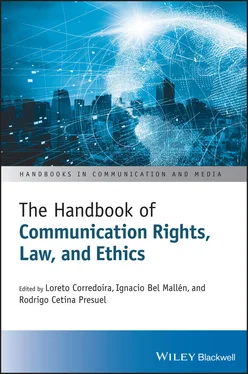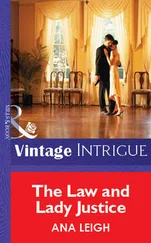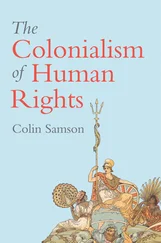Identifiers: LCCN 2020047064 (print) | LCCN 2020047065 (ebook) | ISBN 9781119719403 (hardback) | ISBN 9781119720737 (paperback) | ISBN 9781119719519 (pdf) | ISBN 9781119719496 (epub) | ISBN 9781119719564 (ebook)
Subjects: LCSH: Mass media--Law and legislation. | Freedom of expression. | Freedom of information. | Freedom of speech. | Telecommunication--Law and legislation. | Right to be forgotten. | Data protection--Law and legislation.
Classification: LCC K4240 .H355 2021 (print) | LCC K4240 (ebook) | DDC 342.08/53--dc23
LC record available at https://lccn.loc.gov/2020047064
LC ebook record available at https://lccn.loc.gov/2020047065
Cover image: © metamorworks/Getty Images
Cover design by Wiley
Set in 10/12pt ITC GalliardStd by Integra Software Services, Pondicherry, India
1 Cover
2 Series Page Handbooks in Communication and Media This series provides theoretically ambitious but accessible volumes devoted to the major fields and subfields within communication and media studies. Each volume provides experienced scholars and teachers with a convenient and comprehensive overview of the latest trends and critical directions, while grounding and orientating students with a broad range of specially commissioned chapters. Published The Handbook of Applied Communication Research, edited by H. Dan O’Hair and Mary John O’Hair The Handbook of Public Sector Communication, edited by Vilma Luoma-aho and Maria-Jose Canel The Handbook of European Communication History, edited by Klaus Arnold, Paschal Preston, and Susanne Kinnebrock The Handbook of Magazine Studies, edited by Miglena Sternadori and Tim Holmes The Handbook of Rhetoric and Organizations, edited by Øyvind Ihlen and Robert L. Heath The Handbook of Communication Engagement, edited by Kim A. Johnston and Maureen Taylor The Handbook of Financial Communication and Investor Relations, edited by Alexander V. Laskin The Handbook of Global Media Research, edited by Ingrid Volkmer The Handbook of Global Online Journalism, edited by Eugenia Siapera and Andreas Veglis The Handbook of Media and Mass Communication Theory, edited by Robert S. Fortner and P. Mark Fackler The Handbook of Psychology of Communication Technology, edited by S. Shyam Sundar The Handbook of International Crisis Communication Research, edited by Andreas Schwarz, Matthew W. Seeger, and Claudia Auer Forthcoming The Handbook of Peer Production, edited by Mathieu O’Neil, Christian Pentzold,and Sophie Toupin The Handbook of Listening, edited by Deborah Worthington and Graham Bodie
3 Title Page Handbook of Communication Rights, Law, and Ethics Seeking Universality, Equality, Freedom and Dignity Edited by Loreto Corredoira Complutense University of Madrid Madrid, Spain Ignacio Bel Mallén Complutense University of Madrid Madrid, Spain Rodrigo Cetina Presuel Harvard University Cambridge, USA
4 Copyright
5 Preface
6 Introduction
7 Part I Communication Rights: Principles Chapter 1: Freedom as the Essential Basis for Communication Rights Chapter 2: Dignity, a Revolutionary Principle in a Cosmopolitan Society Chapter 3: Communication Rights in an Internet-Based Society: Why Is the Principle of Universality So Important? Chapter 4: Communication Rights in the United Nations System: From Declarations to “Soft Law” Chapter 5: Universality vs. Standardization: The Privatization of Communication Rights on Social Media Chapter 6: United States and International Communication Rights Frameworks and the Pursuit of Global Consensus
8 Part II Communication Rights: A Study of Subjects and Messages Chapter 7: Communication Rights and Their Messages: News, Opinions, Ideas, and Advertising Chapter 8: Subjects of Communication Rights: A Special Study of Minors Chapter 9: News: Objectivity and Truth Chapter 10: Journalists, Confidentiality, and Sources Chapter 11: Addressing the Risks of Harms Caused by Disinformation: European vs. US Approaches to Testing the Limits of Dignity and Freedom of Expression Online Chapter 12: The Law and Ethics of Journalism in a Changing World: New Professional Realities and Challenges for Communication Professionals
9 Part III Studies in Comparative Communication Law Chapter 13: Data Protection as a Limit to Communication Rights: A General Vision of Data Protection in Europe Chapter 14: Regulation of Internet Intermediaries and Communication Rights Chapter 15: Imperiling Community Memory: The European Right to be Forgotten’s Tampering of Search Engine Results Chapter 16: The Crime of Historical Denialism as a Limit to the Freedom of Expression Chapter 17: Hate Speech in the United States and Abroad: Finding Common Ground Chapter 18: Political Communication and Electoral Campaigns in Europe: The Search for International Standards Chapter 19: One Servant Cannot Serve Two Masters: A Struggle for Divided Loyalties of Media Regulation in Hong Kong Chapter 20: Latin American Thinking in Communication and Advances in Communication Rights Chapter 21: Media Disorder and the Future of Journalism: International Developments and the Challenge of WikiLeaks
10 Part IV At the Intersection of Law and Ethics: Challenges in the Age of Algorithms, Disinformation, and Post-Truth Chapter 22: Public Communication and Sustainability in a Post-Truth Era Chapter 23: Freedom of Expression in Social Networks and Doxing Chapter 24: The Emerging Threat of Synthetic Media: A Consideration of Journalists’ Responsibilities Chapter 25: Journalism Routines Depend on Clicks: Best Practices for Using Metrics in Journalism Chapter 26: Epilogue
11 Index
12 End User License Agreement
1 Chapter 11Figure 11.1 Matrix of disinformation (Frau-Meigs 2021).
1 Cover
2 Series page
3 Title page
4 Copyright
5 Table of Contents
6 Preface
7 Begin Reading
8 Index
9 End User License Agreement
1 i
2 ii
3 iii
4 iv
5 v
6 vi
7 vii
8 viii
9 ix
10 x
11 xi
12 xii
13 1
14 2
15 3
16 4
17 5
18 6
19 7
20 8
21 9
22 10
23 11
24 12
25 13
26 14
27 15
28 16
29 17
30 18
31 19
32 20
33 21
34 22
35 23
36 24
37 25
38 26
39 27
40 28
41 29
42 30
43 31
44 32
45 33
46 34
47 35
48 36
49 37
50 38
51 39
52 40
53 41
54 42
55 43
56 44
57 45
58 46
59 47
60 48
61 49
62 50
63 51
64 52
65 53
66 54
67 55
68 56
69 57
70 58
71 59
72 60
73 61
74 62
75 63
76 64
77 65
78 66
79 67
80 68
81 69
82 70
83 71
84 72
85 73
86 74
87 75
88 76
89 77
90 78
91 79
92 80
93 81
94 82
95 83
96 84
97 85
98 86
99 87
100 88
101 89
102 90
103 91
104 92
105 93
106 94
107 95
108 96
109 97
Читать дальше












